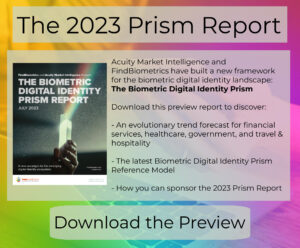Welcome to FindBiometrics’ digest of identity industry news. Here’s what you need to know about the world of digital identity and biometrics today:
OpenAI Puts Biometric Blinders On GPT-4
OpenAI has taken measures to prevent its AI tool, GPT-4, from being used broadly for facial recognition. In addition to performing text-based interactions, GPT-4 can describe images. One participant in a trial of this feature, who is blind, called it an “extraordinary” tool for helping him to understand and interpret the visual world. But he was disappointed to find that the app recently stopped giving him information about people’s faces. OpenAI had changed its facial recognition capabilities so that it will only identify public figures. An OpenAI policy researcher told the New York Times that the company is concerned about privacy violations – including legal liabilities – and about the possibility of GPT-4 misreading an individual’s gender or emotional state.
TikTok Supports Passkeys, Joins FIDO
TikTok has become the latest major tech platform to enable support for passkeys, though only on iOS devices and in certain regions for now. Apple device users in Africa, Asia, Australia, and South Korea can now log into their accounts through a biometric scan or PIN on their mobile device, bypassing the need to enter a username and password. TikTok has also become a member of the FIDO Alliance, joining tech giants like Apple, Google, and Microsoft. The news comes after the popular coding platform Github enabled passkey support for its public beta users last week.
Cruise Line Lauds CBP’s Biometric Debarkation Tech
Carnival Cruise Line says that the facial recognition technology it has installed in partnership with US Customs and Border Protection has sped up the debarkation process by 30 percent on average. The cruise line operator has been using the CBP’s biometric technology to verify passengers’ identities as they have disembarked at ports at a growing number of locations, including Miami, Port Canaveral, Tampa, New York, Baltimore, Mobile, Galveston, Long Beach, and, most recently, Jacksonville.
Graduation Photo Company Hit With BIPA Lawsuit
A company specializing in photographing graduation ceremonies is now facing a lawsuit under Illinois’s Biometric Information Privacy Act (BIPA). GradImages is accused of establishing unique biometric identifiers for the subjects of its photos, and leveraging them to make a profit; in Illinois, it’s illegal to profit from the collection and use of biometric data. A jury trial has been demanded for the class action complaint.
Instagram Reaches $68.5M BIPA Settlement
Meta-owned Instagram has reached a $68.5 million settlement in a class action BIPA lawsuit of its own. The lawsuit claimed that Instagram collected its users’ biometric data without their knowledge or consent. If the settlement is approved, anyone who used Instagram while in Illinois between August 10 of 2015 and August 16 of 2023 will be eligible to claim damages. The deadline to submit claims is September 27, with a final hearing to approve the settlement scheduled for October.
Zwipe Teams With Silicon Valley’s Oloid
Zwipe has established a biometric cards-focused partnership with Oloid, a Silicon Valley startup focused on developing digital identity solutions for the enterprise. Oloid is, of course, interested in leveraging Zwipe’s fingerprint-scanning cards for access control. In a statement, Oloid co-founder and CEO Mohit Garg explained that while a lot of knowledge workers have embraced passwordless technologies, the uptick has been slower for frontline workers. “Biometric access cards provide a massive opportunity to address the needs of this under served segment of users who do not work on company provided computers and smartphones but require freedom from user names and passwords related challenges to access workplace applications on kiosks and shared terminals,” he said.
FPC Establishes ‘New Business’ Unit
Fingerprint Cards has established a new business unit focused on, well, new business. It’s called “New Business”. And it will be focused on four key areas: Establishing new partnerships to expand into adjacent markets; the automotive sector, where FPC belies its iris recognition technology could play a particularly important role; monetizing Fingerprints’ robust intellectual property portfolio of about 600 registered patents; and exploring merger and acquisition opportunities. The New Business unit will be headed by Thomas Rex, a senior executive who has been with the company since 2011.
–
July 18, 2023 – by Alex Perala








Follow Us